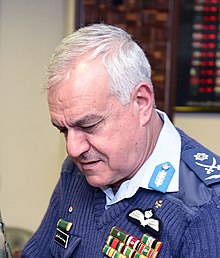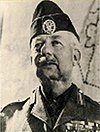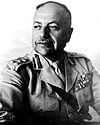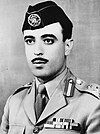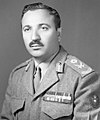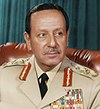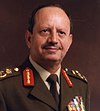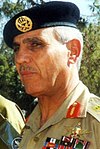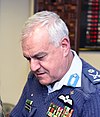
The Joint Chiefs of Staff (JCS) is the body of the most senior uniformed leaders within the United States Department of Defense, which advises the president of the United States, the secretary of defense, the Homeland Security Council and the National Security Council on military matters. The composition of the Joint Chiefs of Staff is defined by statute and consists of a chairman (CJCS), a vice chairman (VJCS), the chiefs of the Army, Marine Corps, Navy, Air Force, Space Force, and the chief of the National Guard Bureau. Each of the individual service chiefs, outside their JCS obligations, works directly under the secretaries of their respective military departments, e.g. the secretary of the Army, the secretary of the Navy, and the secretary of the Air Force.

The chairman of the Joint Chiefs of Staff (CJCS) is the presiding officer of the Joint Chiefs of Staff (JCS). The chairman is the highest-ranking and most senior military officer in the United States Armed Forces and the principal military advisor to the president, the National Security Council, the Homeland Security Council, and the secretary of defense. While the chairman of the Joint Chiefs of Staff outranks all other commissioned officers, the chairman is prohibited by law from having operational command authority over the armed forces; however, the chairman assists the president and the secretary of defense in exercising their command functions.

The vice chairman of the Joint Chiefs of Staff (VJCS) is, by U.S. law, the second highest-ranking military officer in the United States Armed Forces, ranking just below the chairman of the Joint Chiefs of Staff. The vice chairman outranks all respective heads of each service branch, with the exception of the chairman, but does not have operational command authority over their service branches. The vice chairman assists the chairman in exercising their duties. In the absence of the chairman, the vice chairman presides over the meetings of the Joint Chiefs of Staff and performs all other duties prescribed under 10 U.S.C. § 153 and may also perform other duties that the president, the chairman, or the secretary of defense prescribes.

The Chiefs of Staff Committee (CSC) is composed of the most senior military personnel in the British Armed Forces who advise on operational military matters and the preparation and conduct of military operations. The committee consists of the Chief of the Defence Staff who is the chairman and professional head of the forces, the Vice-Chief of the Defence Staff, who is the vice-chairman and deputy professional head of the armed forces. The committee also consists of the professional heads of each branch of the armed forces: the First Sea Lord and Chief of the Naval Staff, the Chief of the General Staff and the Chief of the Air Staff.

The Chairman Joint Chiefs of Staff Committee (CJCSC) is, in principle, the highest-ranking and senior most uniformed military officer, typically at four-star rank, in the Pakistan Armed Forces who serves as a Principal Staff Officer and a chief military adviser to the civilian government led by elected Prime minister of Pakistan and his/her National Security Council. The role of advisement is also extended to the elected members in the bicameral Parliament and the Ministry of Defence. The Chairman leads the meetings and coordinates the combined efforts of the Joint Chiefs of Staff Committee (JCSC), comprising the Chairman, the Chief of the Army Staff and Chief of the Air Staff and the Chief of the Naval Staff, Commandant of Marines, DG Coast Guards and Strategic Plans Division, and commanders of the service branches in the Civil Armed Forces and the National Guard.

Abdul Munim Riad was an Egyptian military officer and the Chief of Staff of the Egyptian Armed Forces. He commanded the Jordanian Armed Forces during the 1967 Six-Day War and later led the Egyptian forces in the War of Attrition, where he and several of his aides were killed in action in 1969. His death on 9 March is observed as Egyptian Martyrs' Day.

Habis Majali was a Jordanian general. Majali served as Chairman of the Joint Chiefs of Staff of the Jordanian Armed Forces from 1958 to 1975, as Minister of Defense from 1967 to 1968, and as a member of the Jordanian Senate for 30 years from 1967 to 1997.

The Joint Chiefs of Staff Committee (JCSC), ; is an administrative body of senior high-ranking uniformed military leaders of the unified Pakistan Armed Forces who advises the civilian Government of Pakistan, National Security Council, Defence Minister, President and Prime minister of Pakistan on important military and non-military strategic matters. It is defined by statute, and consists of a Chairman, the military chiefs from Army, Navy and the Air Force: all four-star officers appointed by the President, on the advice of the Prime minister. The chairman is selected based on seniority and merit from the Chiefs of service of the three branches of the Pakistan Armed and Defense Services. Each service chief, outside their Joint Chiefs of Staff obligations, performs their duty directly for the Ministry of Defence.

The Royal Jordanian Army is the ground force branch of the Jordanian Armed Forces (JAF). It draws its origins from units such as the Arab Legion, formed in the British Mandate of Transjordan in the 1920s. It has seen combat against Israel in 1948, 1956, 1967, and 1973. The Army also fought the Syrians and the PLO during Black September in 1970.

The Jordanian Armed Forces (JAF), also referred to as the Arab Army, are the military forces of the Hashemite Kingdom of Jordan. They consist of the ground forces, air force, and navy. They are under the direct control of the King of Jordan who is the Supreme Commander of the Jordanian Armed Forces and acts by recommendation of the Defence Minister. The current Chairman of the Joint Chiefs of Staff is Major General Yousef Huneiti, who is also the King's military adviser.

The Chief of General Staff is the highest professional military authority in the Romanian Armed Forces. He is appointed by the President of Romania, at the National Defense Minister's proposal on a four-year period, with the possibility of one-year extension. The Deputy Chief of General Staff or one of the Chiefs of the Services can be appointed in this position.

The Chief of the Defence Staff (CDS) is the most senior appointment in the Sri Lankan Armed Forces, and the highest-ranking military officer in service, outranking the heads of each service branch. The CDS does not, however, have operational command authority over service branches, but rather oversees inter-service co-operation and develops and implements the joint operations doctrine of the Sri Lankan armed forces. Coordination of inter-service joint operations are handled by the Office of the Chief of the Defence Staff, formally known as the Joint Operations Headquarters.

The Chief of Staff of the Armed Forces of the Philippines (CSAFP) is the highest-ranking military officer and the head of the Armed Forces of the Philippines (AFP), including all service branches under its command. The position is usually held by a four-star rank of General or Admiral. Its direct equivalent in the US Armed Forces is the Chairman of the Joint Chiefs of Staff. Unlike its US counterpart, which is merely supervisory, the Chief of Staff has complete operational control within the military hierarchy and is responsible for the overall operations of the AFP.

Ibrahim Abdul Ghafour El Orabi ; 20 May 1931 – 18 September 2019) was an Egyptian Army Lieutenant General and the 13th former Chief of Staff of the Egyptian Armed Forces.
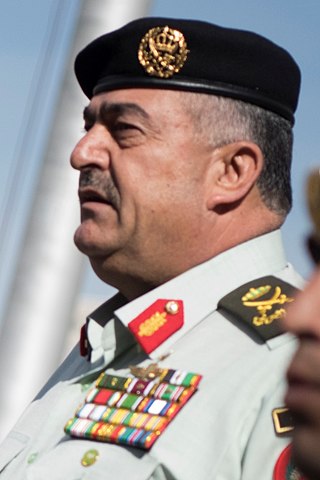
Lieutenant General Mahmoud Freihat is a former Chairman of the Joint Chiefs of Staff of the Jordanian Armed Forces. Freihat was appointed to this position on 2 October 2016 and served until 24 July 2019.

General officer Mohammad Yousef al-Malkawi is a Jordanian general and politician. He was the former King's Chancellor. Also, he held the post of Chairman of the Joint Chiefs of Staff of the Jordanian Armed Forces from 18 July 1999, to 5 March 2002. Notably, upon King Abdullah's accession to the throne following the death of King Hussein, al-Malkawi assumed command of the Jordanian Army, further solidifying his pivotal role in Jordan's military landscape. Throughout his illustrious career, he held numerous key positions within the country, leaving a lasting impact on both the military and political fronts. Currently, he is a member of the Jordanian Senate.

Major General Yousef Huneiti is the current Chairman of the Joint Chiefs of Staff of the Jordanian Armed Forces. Huneiti was appointed to this position on 24 July 2019. Huneiti is the first Jordanian Air Force commander to be appointed Chief of the Armed Forces.
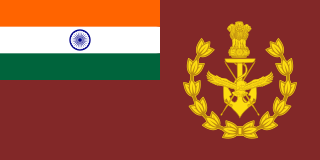
The Chief of Defence Staff (CDS) is the principal military authority and senior-most appointment of the Indian Armed Forces. Deemed the overall professional head of India’s three armed services, namely, the Indian Army, the Indian Navy and the Indian Air Force, the CDS is the highest-ranking military officer in service, responsible for overseeing inter-service jointness across all disciplines related to military functioning. Primarily, the office operates on a status of primus inter pares i.e., first among equals with the chiefs of the three services, and functions as the Permanent-Chairman of the Chiefs of Staff Committee (COSC) – the inter-service syndicate responsible for ensuring the establishment and preservation of military integration.

General Nadeem Raza NI(M), HI(M) is a retired four-star army general of the Pakistan Army who got commissioned in 10 Sind Regiment in September 1985. He served 17th Chairman Joint Chiefs of Staff Committee. Raza was previously the Corps Commander of the X Corps (Pakistan) and CGS and General Officer Commanding 9th infantry division, Wana and Commandant of the Pakistan Military Academy.
The Order of Military Merit is an order of the Kingdom of Jordan.
